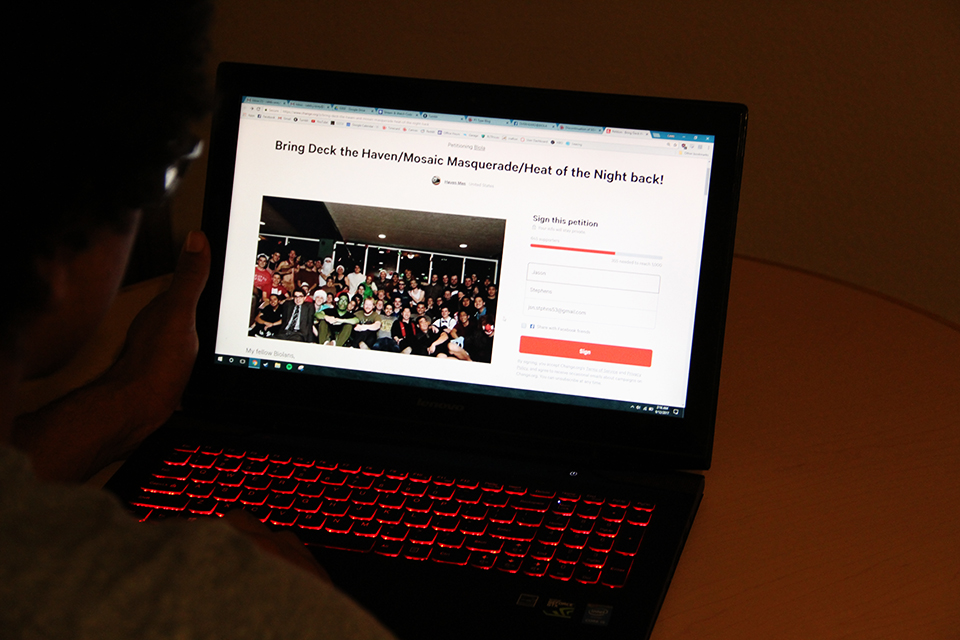Student Development announced the discontinuation of Deck the Haven and Mosaic Masquerade in early August.
ongoing violations & misuse
Students learned of this announcement on Biola’s student life blog. In response, Haven residents created a petition which has since gained 644 signatures since originally shared on social media. These events were canceled due to a history of damaged facilities and expressed frustration from various departments, according to that article. Administrators involved in the decision stressed it was not made by Student Government Association or Student Programming and Activities. SGA advisor and director of SPA Laura Igram and director of Residence Life Garrett Suhr made the final decision in collaboration with Student Development.
While these events took place for many years, their scope, size and attendance has grown significantly over the past five years. The budget has also steadily increased to over $5,000.
“We did not discontinue the events because of the cost. The funds are there and have been there for student government to provide. The primary reason is the ongoing violation of university policies and misuse of residential facilities,” Igram said.
Igram says her personal concern over these events grew in past years, as she became aware of frustrations and concerns from other departments, specifically the office of Residential Facilities. Every year, students sign a form which says they will not disassemble furniture and move it out of rooms. Despite this, reports of damage to floors, walls and ceilings have persisted through the years.
Laura began talking to resident advisors from both floors about a year ago. She expressed to them her concerns and the specific issues she was aware of.
“I’m was seeing a lot of issues in term of finance forms that are incorrectly filled out and accounting forms and HR forms if they want to hire students,” Igram said.
After the events, Student Development had a difficult time helping the accounting and finance departments reconcile differences in cash advances given to students and receipts that were actually turned in. The offices involved were concerned about this because of the auditing of the university’s budget by the Internal Revenue Service.
The process of pulling off events of this scale is not simple, including obtaining permission from Risk Management. However, SPA believes that students have not violated policies intentionally. Without someone specifically assigned to help students navigate these complexities, it has been nearly impossible for all standards to be met.
Surprised over decision
However, some students involved with Mosaic Masquerade were surprised to find out that not all of the university’s standards were met.
“It’s been going on for so many years, that it has pretty much a system of the way that it works. So, it’s super easy to figure out,” said Wyatt Redfern, former residence advisor of Mosaic and junior political science major.
Redfern was not overly surprised about the cancellation of events, even though he did not feel any special scrutiny in the past year.
“It would have been nice to hear beforehand that they were really checking out this event, to make sure everything is perfect. But I mean, in the end it was their money so they got to do what they got to do,” Redfern said.
Senior sociology major and former resident of Haven Zachary Ikeda also reported he was not aware of the nature of the concern prior to last year’s event.
“Before the event, I can’t say that I was aware of the exact same concerns that were written about in the statement. There was some awareness that they were trying to regulate our event more, but it seemed like it was in terms of funds… everything else was a complete surprise to me this summer when they told us it was canceled,” Ikeda said.
Concerns over location & oversight.
Students who met with Igram and Suhr after the announcement were made aware of two main concerns, which involved location and oversight. The students suggested moving the event and proposed several different locations, and Ikeda personally offered to provide oversight and take responsibility for the event.
“If it’s oversight you’re worried about, I think I’m very capable and I could take over this event. And I definitely don’t need to be paid,” Ikeda said.
Ikeda’s frustration remains focused on what he sees as SGA’s unwillingness to consider the suggestions he and other students made to continue the events in a way that met the university’s requirements.
Students will miss these events because of the community they offered.
“It’s one of the few events where students could come together, no matter who you were or what major you were in, and you could hang out and have a good time. And the ones that were canceled were the main events where people were able to do that,” Redfern said.
As of this time, the offices involved do not have a plan to reinstate the events and have not approved any alternative plans.







